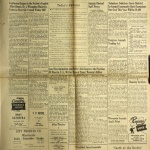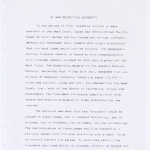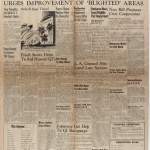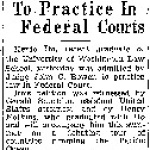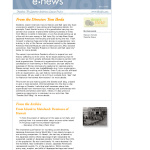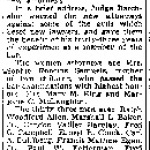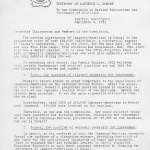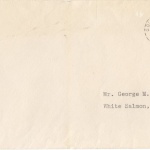J. Garner Anthony
| Name | J. Garner Anthony |
|---|---|
| Born | December 19 1899 |
| Died | October 31 1982 |
| Birth Location | Philadelphia |
J. Garner Anthony (1899–1982) was a prominent lawyer and served as Hawai'i's territorial attorney general and Hawai'i Constitutional Convention delegate who fought against the imposition of martial law in the Islands during World War II. [1]
Born in Philadelphia in 1899, Anthony served as a field artillery sergeant in World War I. Following his graduation from Pennsylvania's Swarthmore College in 1923, he received his law degree from Harvard Law School in 1926. That same year, he married the former Dorothy McClaren, moved to Hawai'i and was admitted to the local bar. Anthony, who was president of the Bar Association of Hawai'i from 1937 to 1939, was known primarily as a top business lawyer until the December 7, 1941 attack on Pearl Harbor when he became one of the most outspoken opponents of martial law. In 1942, Anthony wrote in the California Law Review , "No statute authorizes the chief justice to close the courts, nor is there any authority in the Organic Act (the federal law under which Hawaii became a territory) for the complete delegation of power by the governor and the appointment of a military governor." [2] In 1942, Anthony was appointed territorial attorney general and in this capacity continued to work for the return of civil government to Hawai'i. In a talk before the University of Hawai'i graduating class of 1943, Anthony was also critical of suggestions made soon after the start of World War II that persons of Japanese descent be removed from the Islands stating, "Those suggestions, which fortunately are no longer current, savor of fascism in one of its ugliest forms, the mass condemnation of people simply because of the accident of birth—their racial ancestry." [3]
In late 1943, Anthony resigned as attorney general and became involved in a case to challenge the legality of convictions of civilians by military courts. On February 24, 1944, a Pearl Harbor civilian worker fought with a Marine sentry outside the navy base. A military provost court convicted the civilian of assault and sentenced him to six months in jail. As the attorney for the worker, Anthony sought the release of his client on the grounds that the military court had no authority over a civilian. Federal Judge Delbert E. Metzger agreed with Anthony's argument and ruled that the military had no authority over a civilian and could not send him to jail. The Army appealed the ruling to the U.S. Supreme Court and in 1946, two years after the incident, the Supreme Court upheld Metzger's ruling, establishing a legal landmark decision that all provost court convictions against civilians during the martial law period were illegal.
As a result of his experiences, Anthony wrote a book, Hawaii Under Military Rule , detailing the social, political, economic and legal implications of martial law. Later, Anthony was a member and chairman of the judiciary committee of the 1950 State Constitutional Convention. In 1958, he was appointed to the Hawai'i Statehood Commission and the University of Hawai'i Board of Regents by his former law partner, Governor William Quinn. Anthony also headed the 34-member committee appointed by the Hawai'i Supreme Court in 1962 to help modernize procedures in Hawai'i's courts. He served on the Hawaii Advisory committee of the U.S. Civil Rights Commission that was investigating voter registration in the U.S. south and housing discrimination in New York City. In 1960, Anthony was a member of the policy making House of Delegates of the American Bar Association, served on its board of governors, and was one of ten U.S. delegates to the International Bar Association's biennial conference in Salzburg, Austria.
In addition to his national and international service to the legal profession, Anthony also served as president of Queen's Hospital, was a director of Foremost Dairies, served as chairman of the board of Honolulu Rapid Transit Co., and was a member of the Samuel Northrup and Mary Castle Foundation. Anthony died in 1982, survived by his wife Dorothy and a son, Garner, who was chairman of Cox Enterprises.
For More Information
"Anthony dies—argued against Isle martial law." Honolulu Advertiser , November 3, 1982, A-16.
Anthony, J. Garner. Hawaii Under Army Rule . Honolulu: University of Hawaii Press, 1955.
---. "Martial Law in Hawaii." California Law Review 30.4 (May 1942): 371-396.
---. "Martial Law, Military Government, and the Writ of Habeas Corpus in Hawaii." California Law Review 31.5 (December 1943): 477-514.
"J.G. Anthony, Martial Law Foe, Is Dead at 82." Honolulu Star-Bulletin , November 2, 1982, A-1.
"J. Garner Anthony." Honolulu Advertiser , November 4, 1982, A-18.
"J. Garner Anthony, Distinguished Attorney." Honolulu Star-Bulletin , November 2, 1982, A-18.
Footnotes
- ↑ Research for this article was supported by a grant from the Hawai‘i Council for the Humanities .
- ↑ "Anthony dies—argued against Isle martial law," Honolulu Advertiser , November 3, 1982, A-16.
- ↑ "Anthony dies—argued against Isle martial law," Honolulu Advertiser , November 3, 1982, A-16.
Last updated July 2, 2020, 6:11 p.m..

